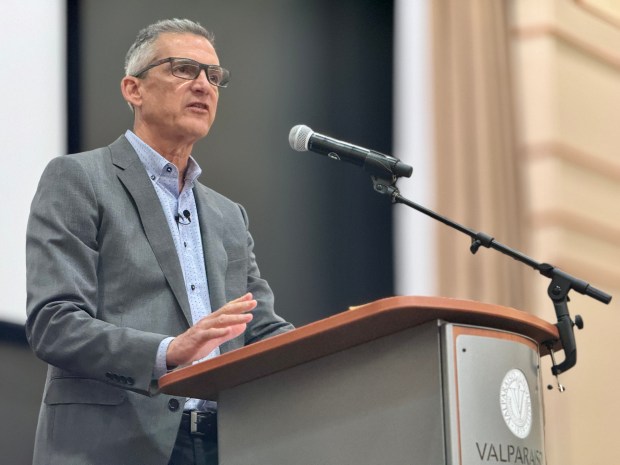The Aurora City Council Tuesday night approved an amendment to a redevelopment agreement to provide a $5.75 million increase in the incentive the city is providing to a 258-unit apartment complex along North Broadway downtown.
Aldermen voted 9-2 to increase the incentive by $5.75 million to about $12.6 million overall for the $87 million development by DAC Developments LLC, of Chicago, between North Broadway and the Fox River downtown.
DAC has already begun building a 343,421-square-foot building with 258 apartments – a mix of studios, one-, two- and three-bedrooms – to be called the East Bank Apartments.
Developers said this week they have already put $8 million into the project and have $75 million in private funding in place for it. When the project plans started as far back as 2021, the original overall cost was to be about $68.5 million. That is now up to about $87 million.
The incentive will be paid for with money generated by the tax increment financing district on the property.
The additional incentive will be paid upfront with money from the gaming tax funds, with $1 million of it coming from the general fund. That money will be reimbursed with money from the increment, as it is generated, from the TIF district, according to city officials.
Both city officials and developers said the increase in the project cost is from a number of factors, some of which are affecting development across the country, and some of which are peculiar to the specific site.
Inflation and a change in what lenders are doing created part of the increased costs, and those are costs all developments have been facing, officials said.
Cost increases peculiar to this individual development are related to what happened when developers began digging on a site that was first built on about 150 years ago.
Several industrial uses were on the site dating back to at least the 1880s, and a construction management official has said when buildings were torn down, the material was buried on the site, covered over, and built upon again.
He said as developers started digging they kept encountering these “layers of history.”
The construction manager said the cost of digging, and the cost of hauling material off the site, has grown.
Officials said the last building on the site appeared to have been town down about 1988.
One of the two votes against the increase came from Ald. John Laesch, at large, who called the redevelopment agreement “just another form of corporate welfare.”
He said the same inflation affecting developers affects all Aurorans day to day. He said Aurora residents would be asked to “subsidize” the development.
Mayor Richard Irvin called that “not correct.”
He and Chris Minick, the city’s chief financial officer, said because the money will be reimbursed from the increment on the property, it would not come from any tax funds.
“We do not anticipate a tax increase as a result of this particular development,” Minick said.
Irvin pointed out that the money in the increment is created by the developer, by the development itself.
“They are getting a portion of the wealth they develop,” he said.
Dibo said the return the city gets from the money it will spend includes an improved site along the riverfront, improved value for the surrounding properties and jobs, both short-term and long-term.
He said the concept of residential uses along the riverfront has been a goal of Aurora planning for a long time.
The rents for the apartments would run from about $1,700 or $1,800 a month up to $2,200 a month.
Developers said they are looking at a completion date in the spring of 2026.
slord@tribpub.com




